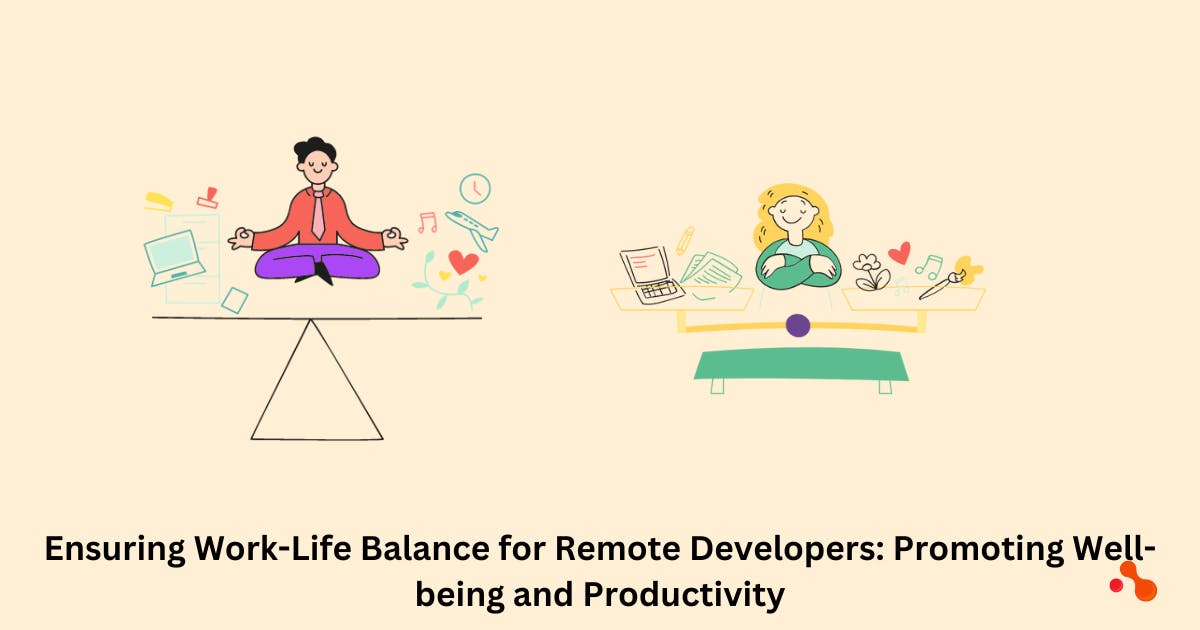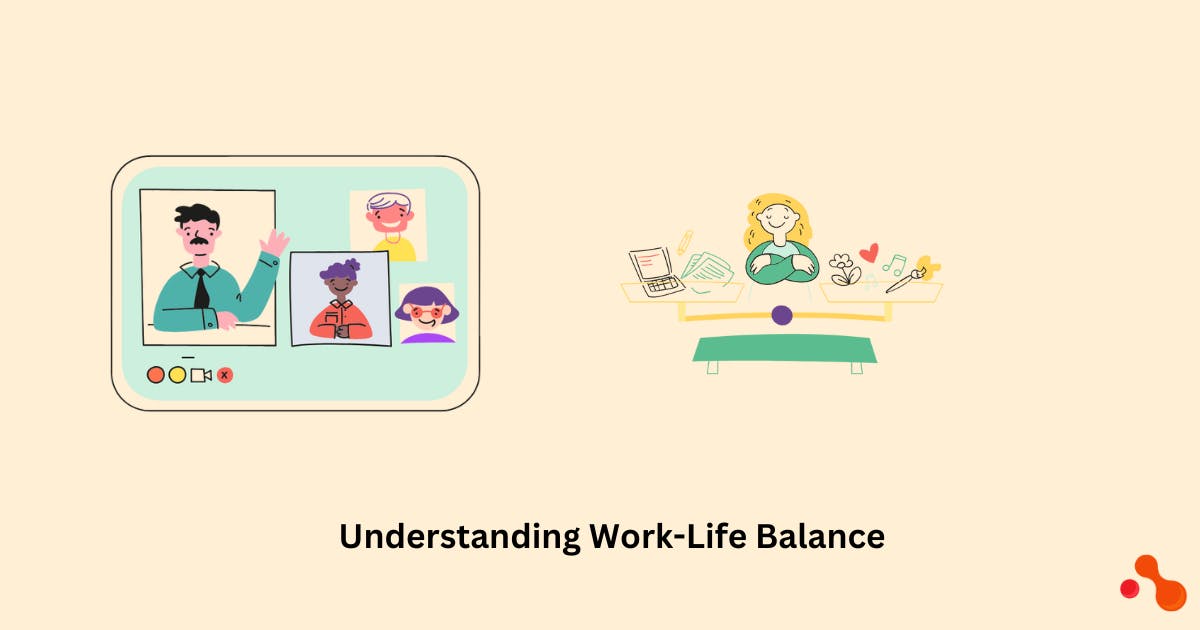Ensuring Work-Life Balance for Remote Developers: Promoting Well-being and Productivity
Introduction
Welcome to our blog post on ensuring work-life balance for remote developers! In this digital age, many companies hire remote developers, and focusing on their well-being and productivity is crucial. But what exactly is work-life balance? It's about finding a healthy equilibrium between work responsibilities and personal life, ensuring developers have time for relaxation, hobbies, and spending quality moments with loved ones. Imagine being able to pursue your passion for coding while also having time to enjoy other activities! In this blog, we'll explore practical tips, real-life examples, and strategies to help remote developers achieve work-life balance while staying productive. So, let's dive in!

Understanding Work-Life Balance
Work-life balance refers to finding a healthy equilibrium between work and personal life. It is important because it allows individuals to have time for work and for themselves, their families, and their hobbies. Imagine if all you did was work, without any time for relaxation or doing things you enjoy—it would be like eating the same food every day without any variety! Here are some key points to understand about work-life balance:

- Definition and Significance of Work-Life Balance:
Work-life balance means balancing your work responsibilities and personal life outside of work.
It is important because it helps prevent burnout, reduces stress, and promotes well-being.
Achieving a work-life balance gives individuals more time and energy for activities they enjoy and those they care about.
- Challenges Faced by Remote Developers in Achieving Work-Life Balance:
Remote developers often face challenges in setting boundaries between work and personal life because they work from home or outside a traditional office setting.
Separating work hours from personal time can be difficult, leading to longer work hours and decreased personal time.
Distractions at home, such as household chores or family responsibilities, can make it challenging to focus solely on work.
- Linking Work-Life Balance to Well-being and Productivity:
A good work-life balance contributes to better overall mental and physical well-being.
When individuals have time for rest, relaxation, and activities they enjoy, they feel happier and more fulfilled.
A healthy work-life balance also improves productivity because individuals are more focused, motivated, and energized when they have time for self-care.
- Benefits of a Healthy Work-Life Balance for Remote Developers:
Improved mental and physical health reduces stress levels and increases happiness.
Enhanced productivity and job satisfaction, resulting in better quality work.
Stronger relationships with family and friends due to having more time for social activities.
Increased creativity and inspiration, as individuals have time to pursue hobbies and interests outside of work.
"Hiring remote developers is essential for maintaining a healthy work-life balance. Finding talented individuals who can thrive in a remote work environment not only enables them to lead fulfilling lives but also ensures optimal performance in their professional and personal spheres.”
Establishing Boundaries and Routines
Setting clear boundaries between work and personal life is essential to maintain a healthy balance and avoid burnout. Here's why it's important and how you can do it:

- Importance of setting clear boundaries between work and personal life:
Helps you focus: By defining specific work and personal activities times, you can concentrate on one thing at a time without distractions.
Reduces stress: When you separate work from personal life, you can unwind and relax, which lowers stress levels and improves overall well-being.
Improves productivity: Having designated work hours ensure you allocate enough time for tasks, enhancing your efficiency and output.
- Creating a dedicated workspace at home:
Find a quiet corner: Identify a spot in your home where you can work without interruptions or excessive noise.
Organize your essentials: Set up a desk or table with all the necessary supplies, such as a computer, stationery, and a comfortable chair.
Personalize your space: Add inspiring elements, like motivational quotes, plants, or artwork.
- Establishing and following a structured daily routine:
Plan your day: Create a schedule including work-related tasks and personal activities.
Set specific work hours: Determine when to focus solely on work, ensuring you allocate enough time for breaks.
Include leisure activities: Incorporate time for hobbies, exercise, or spending time with friends and family to maintain a well-rounded routine.
- Utilizing time management techniques, such as the Pomodoro Technique:
Break your work into intervals: Divide your work into manageable chunks, typically 25 minutes each (known as Pomodoros).
Take short breaks: After each Pomodoro, take a 5-minute break to rest and recharge.
Reward yourself: After completing a set of Pomodoros, treat yourself with a longer break, such as 15-30 minutes.
For example, imagine you're working on a programming project:
Set boundaries by deciding to work from 9 AM to 12 PM and then take a break for lunch.
Create a workspace with your computer, notebooks, and other tools.
Follow a routine by dedicating specific time slots for coding, debugging, and researching.
Utilize the Pomodoro Technique by working on coding tasks for 25 minutes, taking a short break, and repeating the cycle.
Remember, establishing clear boundaries and routines will help you stay focused, maintain a healthy work-life balance, and achieve your goals effectively.
Managing Remote Work Challenges
Working remotely as a developer can come with its own set of challenges. Let's explore some common hurdles and discover effective strategies to overcome them.

- Isolation:
Being alone for long periods can feel isolating. To combat this, engage in social interactions and connect with others online. Here's how:
Join virtual communities or forums where developers discuss their work and share ideas. For example, you can participate in programming-related subreddits or join developer communities on platforms like Discord or Slack.
Attend online coding meetups or webinars to interact with fellow developers who share similar interests. It's a great way to make new friends and expand your network.
- Communication Issues:
Communication is vital when working remotely, as you don't have the luxury of face-to-face interactions. Here are some strategies to improve communication:
Have regular check-ins with your team. Schedule video calls or use messaging apps to discuss project updates, clarify doubts, and stay connected.
Utilize collaboration tools like Trello, Asana, or Jira, which allow you to track tasks, assign responsibilities, and communicate within the team. It ensures everyone is on the same page and promotes effective teamwork.
- Distractions and Maintaining Focus:
Staying focused while working from home can be challenging due to numerous distractions. Try these strategies to manage distractions and maintain productivity:
Designate a dedicated workspace at home where you can work without interruptions. Keep it organized and free from distractions like video games or noisy environments.
Use time management techniques, such as the Pomodoro Technique. Set a timer for 25 minutes of focused work, followed by a 5-minute break. Repeat this cycle a few times, then take a longer break. It helps break down work into manageable chunks and enhances productivity.
Create a daily schedule or to-do list outlining your tasks and deadlines. Having a clear plan will motivate you and help you accomplish your goals more efficiently.
Remember, even though hiring a remote developer can present challenges, there are various strategies you can employ to overcome them. By actively participating in online communities dedicated to remote work and software development, communicating effectively with your remote team, and managing distractions effectively, you'll be well-equipped to excel as a remote developer and successfully hire remote developers, regardless of their age!
Self-Care and Well-being
Taking care of yourself is important, especially if you're a remote developer. It helps you feel good and stay healthy. Let's talk about some simple things you can do to care for yourself and ensure you're doing well overall.
- Exercise and Healthy Habits:
Exercise regularly: You can walk, ride a bike, or even do a quick workout at home. Moving your body helps you stay fit and boosts your mood.
Eat healthy foods: Choose nutritious options like fruits, vegetables, whole grains, and lean proteins. Avoid too much junk food and sugary drinks.
Drink plenty of water: Staying hydrated is important for your body and brain to function well.
- Managing Stress and Avoiding Burnout:
Take breaks: When you're working, remember to take short breaks to rest your mind and relax. You can stretch, listen to music, or chat with a friend.
Practice deep breathing: If you feel stressed or overwhelmed, take a deep breath through your nose, hold it for a few seconds, and breathe slowly through your mouth. This can help calm you down.
Set boundaries: It's important to balance work and personal life. Define specific work hours and stick to them. Avoid working late into the night or on weekends unless necessary.
- Work-Life Integration and Pursuing Hobbies:
Find time for activities you enjoy: Engage in hobbies or interests outside of work, such as playing a musical instrument, painting, or a sport. These activities help you relax and recharge.
Spend time with loved ones: Connect with your family and friends regularly. It can be as simple as having a meal or chatting over a video call.
Make a schedule: Plan your day, including work and personal activities. This way, you can ensure you have time for everything important.
Remember, taking care of yourself is not selfish. It helps you become more productive and happier in the long run. So, prioritise self-care and find a balance that works for you.
By practising these self-care strategies, you'll be able to enjoy your work as a remote developer while also taking care of your overall well-being. Stay healthy, be happy, and keep on coding!
Conclusion
In conclusion, when seeking to hire remote developers, it is essential to embrace a work-life balance mindset. By doing so, companies empower their developers to manage their time effectively and create an environment that promotes both well-being and productivity. Investing in work-life balance not only leads to happier and more motivated employees but also yields better outcomes for the company as a whole. So, if you are considering hiring developers, remember the importance of blending work and personal life harmoniously to unlock the benefits of a more content, driven, and productive workforce.